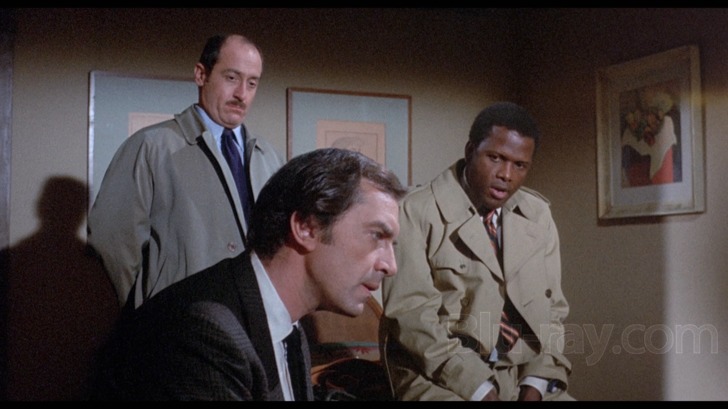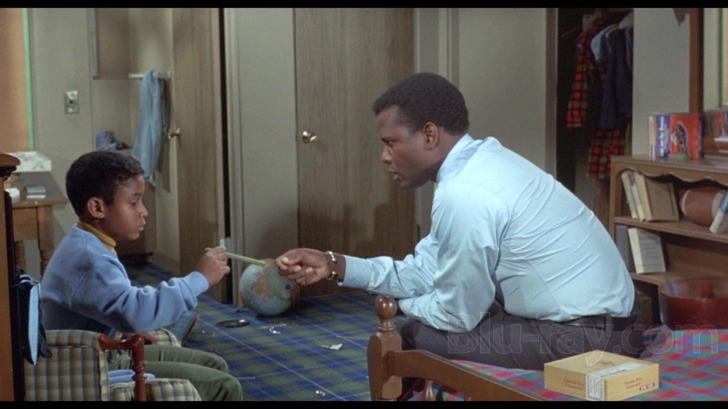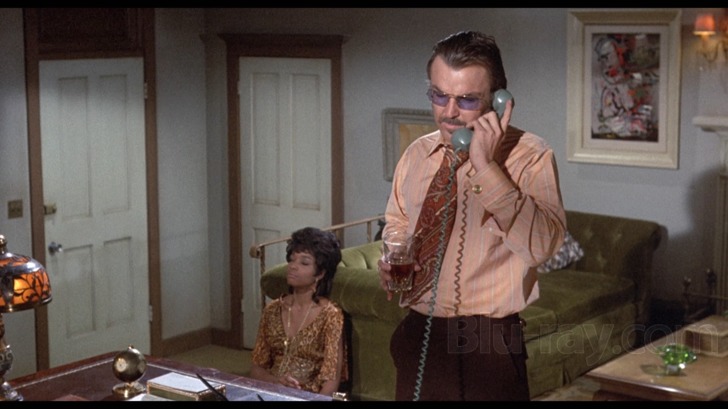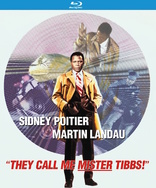They Call Me MISTER Tibbs! Blu-ray Movie
HomeThey Call Me MISTER Tibbs! Blu-ray Movie 
Kino Lorber | 1970 | 109 min | Rated R | May 12, 2015Movie rating
6.3 | / 10 |
Blu-ray rating
| Users | 3.5 | |
| Reviewer | 3.0 | |
| Overall | 3.0 |
Overview
They Call Me MISTER Tibbs! (1970)
When a liberal street preacher and political candidate is accused of murdering a prostitute, San Francisco Police Lieutenant Virgil Tibbs is called in to investigate.
Starring: Sidney Poitier, Martin Landau, Barbara McNair, Anthony Zerbe, Edward AsnerDirector: Gordon Douglas
| Drama | Uncertain |
| Crime | Uncertain |
| Mystery | Uncertain |
Specifications
Video
Video codec: MPEG-4 AVC
Video resolution: 1080p
Aspect ratio: 1.85:1
Original aspect ratio: 1.85:1
Audio
English: DTS-HD Master Audio 2.0 Mono
Subtitles
None
Discs
25GB Blu-ray Disc
Single disc (1 BD)
Playback
Region A (B, C untested)
Review
Rating summary
| Movie | 2.0 | |
| Video | 4.0 | |
| Audio | 3.5 | |
| Extras | 0.5 | |
| Overall | 3.0 |
They Call Me MISTER Tibbs! Blu-ray Movie Review
Where's Chief Gillespie When You Need Him?
Reviewed by Michael Reuben April 21, 2015Cash-in sequels aren't a new phenomenon. After the critical and popular success of In the Heat of the Night, producer Walter Mirisch tried to build a franchise around the steely big city detective Virgil Tibbs played by Sidney Poitier, who had managed to crack a murder case while battling small-town racism. In the original novel by John Ball, Tibbs had been passing through town on his way back to his regular job in Pasadena, California, but the screenplay had shifted his beat to Philadelphia. For the film sequel, Tibbs became a San Francisco detective, probably because the location was more convenient for filming. Mirish hired two fine writers to create an original screenplay: Alan R. Trustman, who wrote the original The Thomas Crown Affair, and James R. Webb, the original adapter of Cape Fear. The director was Gordon Douglas, who would enjoy success in the detective genre with Frank Sinatra in Tony Rome and The Detective and Lady in Cement. But something went wrong with MISTER Tibbs (the title comes from a famous line spoken by Poitier in In the Heat of the Night). Poitier remained as charismatic and interesting as always, but without the complex dynamic between his Tibbs and Rod Steiger's Chief Gillespie, as their antagonism gives way to a grudging partnership in law enforcement, the sequel became nothing more than a routine police procedural—indeed, worse than routine, because nothing about the production feels the least bit credible. From the set design to the costumes to the performances (with the exception of Poitier), the film suffers from a lack of common purpose, as if no one agreed on what the film was about. A thriller? A cop story? A social commentary? All these elements can be dimly glimpsed in MISTER Tibbs, but they're barely (or poorly) developed. Putting Poitier in this picture is like topping a layer of Cheese Whiz with caviar and calling it haute cuisine.

The opening of MISTER Tibbs shows the murder of a call girl named Joy Sturges (Linda Towne) in her apartment. The murderer's face is not visible. The building's handyman, Mealie (Juano Hernandez), finds the body and reports the crime to the resident "manager", Rice Weedon (Anthony Zerbe), who is, in reality, the pimp for Joy and other women living in the building. Weedon phones in an anonymous tip to the police, adding that the murder was committed by Logan Sharpe (Martin Landau), a local preacher and community organizer who regularly visited Joy. Sharpe is something of a local celebrity, and because he is well-known as an old friend of SFPD Lt. Virgil Tibbs (Poitier), the detective's captain (Jeff Corey) assigns Tibbs to the case. Sharpe admits to visiting Joy, to whom he claims he was offering spiritual counseling and trying to persuade to quit prostitution. She was one of many calls he made that day. Sharpe insists that he's being framed by political enemies because of his effectiveness in mobilizing support for a ballot initiative to limit state control over local communities. (The political rhetoric of MISTER Tibbs may sound confusing to contemporary ears, but in 1970 Sharpe's anti-government style of local politics was considered left of center.) As Tibbs and his colleagues, Lt. Kenner (David Sheiner) and Sgt. Deutsch (Ted Gehring), analyze inconclusive forensic evidence, they also consider other suspects, which include Mealie, Rice Weedon and the owner of Joy's apartment building, Woody Garfield (a young Ed Asner, looking uncharacteristically slimy with a full toupe). Garfield certainly acts guilty, leading the police on a lengthy pursuit across the Golden Gate Bridge, while his semi-hysterical wife, Marge (Norma Crane), sits at police headquarters listening to the calm exchange of radio chatter between unmarked police cars. And Weedon has serious mob connections in the drug business, which leads to one of the film's best sequences, a frantic foot chase through crowded San Francisco streets. As a counterpoint to the murder investigation, MISTER Tibbs explores Virgil's rocky home life, where his wife, Valerie (Barbara McNair), routinely complains that he spends too little time with his children. It's an underdeveloped subplot, but Poitier does what he can in Virgil's interactions with young Andy and Ginger Tibbs (George and Wanda Spell), especially the teenage Andy, to whom Virgil tries to offer fatherly advice and too often doesn't know what to say. By far the biggest weakness in MISTER Tibbs, though, is the depiction of the friendship between Sharpe and Tibbs, which violates the essential rule of "show, don't tell". The script tells us that the two men are old friends, and Poitier and Landau make their best efforts, but the script doesn't provide them with the material to show a genuine friendship. How did the two men meet? What experiences did they share? How was the bond between them forged, and why has it endured? These questions must be answered, or there's no tension at the center of the story, as Tibbs continually studies Sharpe, not wanting to believe that his friend is a murderer, but also trying to remain objective and follow the evidence. Apparently the screenwriters thought that, if they included scenes of Sharpe engaged in good works (coaching sports for underprivileged kids, preaching in poor neighborhoods, exhorting rapt crowds to exercise their power at the ballot box), that would be enough to make him an obvious candidate as a friend to Virgil Tibbs, since we already know that Tibbs is a paragon. (Except that he isn't, as the twists and turn of In the Heat of the Night revealed.) When Tibbs ultimately solves the murder, it doesn't have the emotional weight it should, because you don't feel there's a vital friendship at stake. It's just another case.
They Call Me MISTER Tibbs! Blu-ray Movie, Video Quality 

They Call Me MISTER Tibbs! was shot by cinematographer Gerald Perry Finnerman, who worked primarily in television, including most episodes of the original Star Trek. Finnerman's lighting was competent and professional, but the framing and style were that of a Seventies TV movie, which is yet another reason why the film feels so different from In the Heat of the Night, with its moody, atmospheric lighting by Haskell Wexler. Kino Video's 1080p, AVC-encoded Blu-ray features a nicely detailed and reasonably sharp image (except in shots that have been deliberately distorted for effect, such as the murder scene). Colors are distinctive but not overly bright or saturated, and black levels appear to be about right. The grain has a slightly more digital appearance than I'd like to see, which suggests that some light sharpening has been applied, but it is not so severe as to create edge halos. Kino has mastered MISTER Tibbs with an average bitrate of 22.99 Mbps, which isn't especially high but appears to have been sufficient for this material.
They Call Me MISTER Tibbs! Blu-ray Movie, Audio Quality 

The film's original mono soundtrack has been encoded as DTS-HD MA 2.0, with identical left and right tracks. It sounds remarkably good, with clear dialogue and an energetic reproduction of Quincy Jones's Seventies funk score (as compared to the blues style the composer used for In the Heat of the Night). The film lacks major action set pieces; even the pursuit of Woody Garfield across the Golden Gate is low key, so that the lack of a multi-channel mix isn't a sacrifice.
They Call Me MISTER Tibbs! Blu-ray Movie, Special Features and Extras 

Other than trailers for In the Heat of the Night (1080p; 1.85:1; 2:24), They Call Me MISTER Tibbs! (1080p; 1.85:1; 2:04) and the second sequel, The Organization (480i; 1.85:1, extended; 2:54), the disc contains no extras.
They Call Me MISTER Tibbs! Blu-ray Movie, Overall Score and Recommendation 

One year after They Call Me MISTER Tibbs!, the Mirisch Corporation took one more shot at a Virgil Tibbs franchise with The Organization, but it too was poorly received. The most successful reinvention of the character was the TV series that ran from 1988 through 1994, first on NBC and then on CBS, that returned Tibbs (now played by Howard Rollins) to a Southern small town and re-paired him with Chief Gillespie (now played by Carroll O'Connor). As a standard-issue big city detective, no one seemed to know how to use him. For those who are interested, Kino's Blu-ray presentation is quite good.
Similar titles
Similar titles you might also like

In the Electric Mist
2008

Twisted
2004

Insomnia
2002

True Detective: The Complete Seasons 1-3
2014-2019

Gone Girl
2014

The Crimson Kimono
Limited Edition to 3000
1959

Prime Suspect 2
1992

Clockers
1995

Wild Horses
2015

Inspector Lewis: Series 8
Lewis: Series 9
2015

In the Heat of the Night 4K
1967

American Gigolo 4K
Standard Edition
1980

Prime Suspect 1
1991

Quai des Orfèvres
1947

Endeavour: Series 2
Masterpiece Mystery | Full UK-Length Edition
2014

Zodiac 4K
Theatrical 4K | Director's Cut BD only
2007

Bad Lieutenant: Port of Call New Orleans
2009

Sharp Objects
2018

Cutter's Way
Limited Edition to 3000
1981

The Black Dahlia
2006

